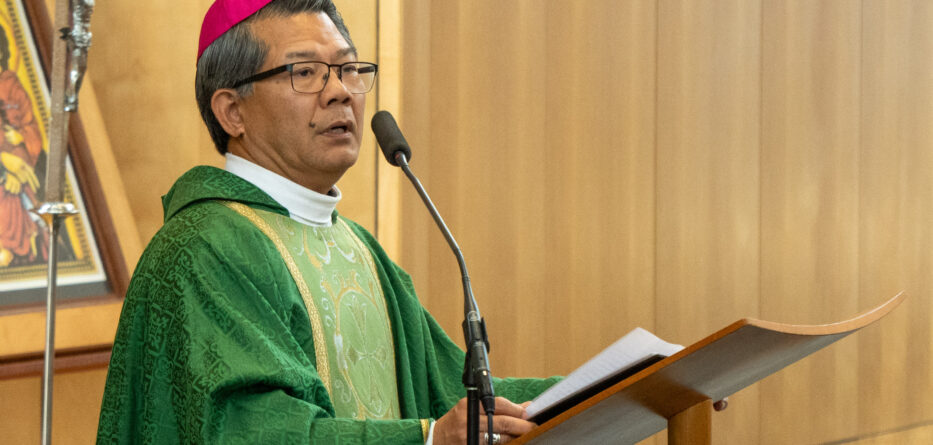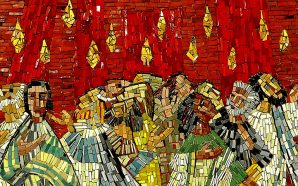Most Reverend Vincent Long Van Nguyen OFM Conv DD STL, Bishop of Parramatta
Homily for the Fourth Sunday of Ordinary Time, Year B
Readings: Deuteronomy 18:15-20; 1Cor 7:32-35; Mark 1:21-28
28 January 2024
Manifesting the distinctive marks of a covenant community.
Dear sisters and brothers,
Once again, Australia Day was marked with celebration, commemoration and as usual a great deal of controversy. Many took part in community events; others sympathized with the pain of First Nations people, while others still spent time reflecting on the bigger meaning of being an Australian. It was also the day we acknowledged the contributions made to the community by the recipients of the Australia Day Honours. We are a nation in flux and may we continue to evolve into a better society and a beacon of hope. As the people of faith, we are challenged to reshape our lives, communities and world in such a way that brings greater justice, peace and human flourishing to all.
Scriptures on this 4th Sunday speak of new beginnings and of the God who heals wounds, engenders hope and awakens confidence in us. We are called to be responsive to what God is doing in the world and to act accordingly.
The reading from Book of Deuteronomy speaks of the impending departure of Moses and the new era of the prophets. The people of Israel would cease their nomadic lifestyle and settle into Palestine, the land of God’s promise. It was a transition time that required the people’s attentive hearing and sensibility. Moses assures them saying that “the Lord your God will raise up for you a prophet like myself, from among yourselves, from your own brothers; to him you must listen.”
Indeed, the new era that followed the Law and Moses was fraught with dangers. The Israelites went through harrowing times of settlement, destruction, exile and colonization. Yet they also experienced profound transformation as a result. Moses’ instructions, contained in the Torah, served as their guide. They were meant to form a society different to the one they had experienced in Egypt, one in which true freedom, justice and human dignity would flourish.
The Book of Deuteronomy became pivotal for the formation of Judaism in the diaspora. They had to find new ways of maintaining their faith and identity because all the traditions associated with the Temple, the land and the priesthood had been taken away from them. In Babylon and other imperial iterations they faced a threat of extinction by assimilation. This was the time when Moses’ call to build a post-exodus society took on a new meaning. Reading the Torah, observing the Sabbath, caring for the poor, promoting justice and living a different code of ethic became the distinctive marks of a covenant people in the liminal and precarious time.
The Gospel story tells us of how Jesus goes about proclaiming the Reign of God and acting with authority reminiscent of Moses. At Capernaum, Jesus performs healing for the sick and gives full meaning to the Sabbath. Sabbath is a reminder of the duty to build a community that takes care of the poor, the indebted and the oppressed. In his caring and inclusive ministry, Jesus enacts God’s vision of such a community. His words and actions carry authority for they are stamped with the divine intent of sabbatical freedom, liberation and emancipation for humanity.
The story of the healing of the demoniac is situated in a context of his encounters with some of the most marginalised people. In healing them, Jesus saw the faith and dignity of people whom society dismissed as inconsequential. He manifested the God who surrounded himself with human vulnerability and insecurity. To be a true believer and an authentic disciple is to do likewise. It is to embrace and accompany the most vulnerable; it is to go and serve them at the liminal and precarious places; it is to transform them into life-changing encounters.
Sisters and brothers,
We give thanks today for our Christian discipleship that engenders hope and promotes transformation. Though we have our weaknesses and limitations, the example and power of Jesus guide us in our endeavor to accompany others on the journey to wholeness. We are emboldened to go to the liminal and precarious places in order to share the Good News and to be the compassionate face of God.
As people of faith, we ascribe to the biblical alternative to the dominant system. We are called to live and relate to each other in a way that is different to the competitive, trickle down, survival-of-the-fittest ideology. Like the faithful remnants of Israel, we must learn to create a new society of solidarity, compassion and justice even at the cost of our privilege and comfort as opposed to the dystopia of exploitation, inhospitality and exclusion.
The kingdom vision of Jesus guides us as we endeavour to be a community that serves as an antidote to the politics of fear, self-interest and the economy of exclusion in our society. We are privileged to be partners with God’s plan for a shared destiny of hope, communion and life for all. Together, we can build a society that is aligned to God’s purposes -a community of solidarity and empathy that Jesus exemplified. May his teaching and example guide us as we join with all people of good will in working for the common good. May we follow the example of Jesus in reaching out to our brothers and sisters, healing wounds, engendering hope, restoring justice through a life of faith, love and service.








